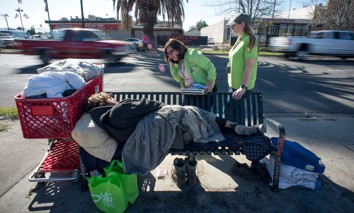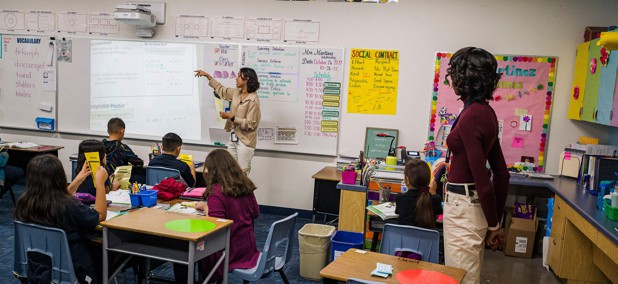Author Archive
Katherine Barrett & Richard Greene

Over the course of nearly 30 years, Katherine Barrett and Richard Greene, principals of Barrett and Greene, Inc. have done much-praised analysis, research and writing about state and local governments. Described by Peter Harkness, founder of Governing Magazine as "by far the most experienced journalists in the country covering public performance," they pioneered "grading the cities, counties and states" in management. Related to that work, they founded the Government Performance Project.
They are columnists and senior advisors at Route Fifty, special project consultants to the Volcker Alliance, senior advisors at the Government Finance Research Center at the University of Illinois in Chicago and fellows in the National Academy of Public Administration. Greene has been named chair of The Center for Accountability and Performance at the American Society for Public Administration (ASPA). In addition, they are visiting fellows at the IBM Center for the Business of Government and consultants to the National Association of State Personnel Executives.
Management
What has been learned about civilian oversight of law enforcement
It’s been four years since the murder of George Floyd, and while political tensions have thrown up obstacles to the approach, the experience of some cities and counties indicates it can help heal sour relations.
- By Katherine Barrett & Richard Greene
Management
Cities are increasingly embracing violence interventions programs to control deadly violence
Initial research indicates the approach is working—saving lives and money. But supporters admit more analysis is needed.
- By Katherine Barrett & Richard Greene
Management
Should Vermont’s child care solution be every state’s?
Legislation passed last year may show a path forward as states across the country look to tackle child care crisis.
- By Katherine Barrett & Richard Greene
Finance
The devil is in the (financial reporting) details
States and localities don’t have the manpower to handle the current load of burdensome financial reporting requirements—let alone the series of new ones announced yearly. They're pushing back.
- By Katherine Barrett & Richard Greene
Workforce
Skills-based hiring smashes through ‘paper ceiling’
Multiple states have embraced a movement to drop degree requirements for certain jobs. But the change is not as simple as a stroke of a pen.
- By Katherine Barrett & Richard Greene
Finance
The great Salt Lake City tax tradeoff
In a few weeks, the city council will be voting on a 0.5% sales tax to support economic development downtown. But it’s not the money that is drawing all the attention, it’s what the city is giving up.
- By Katherine Barrett & Richard Greene
Finance
More cities are seeing budget gaps: Here’s what not to do
A growing number of cities are having to make tough decisions this spring in order to balance next year’s budgets.
- By Katherine Barrett & Richard Greene
Workforce
With the rise of AI, workforce planning is critical. But many governments don’t do it.
That’s a problem when state and local government officials are seeing daily evidence that the nature of their workforce is quickly changing.
- By Katherine Barrett & Richard Greene
Workforce
‘Invisible’ no more: States move to hire people with disabilities
Tapping potential employees with “non-apparent” conditions like autism, attention deficit disorder and chronic depression can bring qualified candidates to a public sector workforce in desperate need of talent.
- By Katherine Barrett & Richard Greene
Management
How collaboration is changing North Carolina, one project at a time
States that want to tap universities and philanthropies to find solutions to policy challenges using the best research, evidence and data should look at how one state mastered the communications and logistics essential for effective partnerships.
- By Katherine Barrett & Richard Greene
Management
Emergency alert: States confront EMS shortages
Minnesota declared an “EMS emergency” last month, but it’s far from alone. An outdated approach to funding the service is largely to blame, says experts.
- By Katherine Barrett & Richard Greene
Management
Trust in government, and opportunities to rebuild it
Confidence in state and local government may have been waning in recent years, but there are ways communities can help to bolster their resident’s faith in them.
- By Katherine Barrett & Richard Greene
Management
How trusted are state and local governments?
Confidence in lower levels of government may be better than in the federal government, but it’s still not nearly good enough. And that stands in the way of state and local leaders’ ability to get things done.
- By Katherine Barrett & Richard Greene
Workforce
The future of government jobs: Post generative AI
In the wake of dramatic technological advances, the workplace of the future will be far different than was envisioned a year ago.
- By Katherine Barrett & Richard Greene
Management
Mental health funding is fast becoming “the bipartisan issue of our time”
States from California to Texas are increasingly investing in mental health as a recognition takes hold that the status quo isn’t working.
- By Katherine Barrett & Richard Greene
Workforce
Data literacy: the drive to educate the public sector workforce
As data-based decision-making becomes ever more important, data academies begin to blossom in local government.
- By Katherine Barrett & Richard Greene
Workforce
Apprenticeship programs are growing as the public sector faces workforce shortages
Registered apprenticeships, infrequently used by state and local governments in the past, are gaining the attention of staff-starved agencies.
- By Katherine Barrett & Richard Greene
Management
Access to public records is 'deteriorating terribly'
In a time when trust in state and local government is under siege, public access to information is particularly vital.
- By Katherine Barrett & Richard Greene
Workforce
Understanding Gen Z in the public sector
Managers can benefit by better engaging and communicating with the newest generation of workers in cities, counties and states.
- By Katherine Barrett & Richard Greene
Finance
Are tax incentives boons or boondoggles?
Though there’s lots of evidence that the economic development tool may not be effective, it is still in wide use. Fortunately, there are ways to control the potential waste of taxpayer dollars.
- By Katherine Barrett & Richard Greene











































